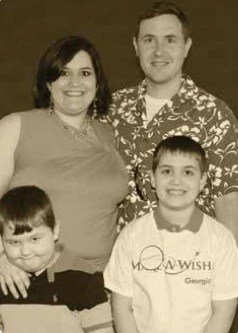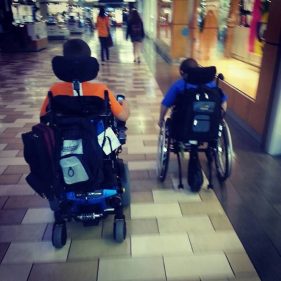
Accepting Generosity
My mother raised me to be a very independent person. At a very early age, I remember being frustrated that I had to make my own lunches when my friends’ moms made theirs for them. If I wanted something clean to wear to school, I knew how to do laundry, and I best make sure it was dried in time. Not only did my mother want me self-sufficient because she was a single mother entrepreneur, but she wanted me to never need to rely on another human to care for me – whether that be a man or anyone else.
Some may think my mother was cruel, but the reality is that, like most of us, she did the best she could. She was teaching me important life lessons via tough love. Regardless of the method, the root was love. No matter how upset I got with her through those teenage years, deep down I knew that.
For many years of my marriage, my independence was a fault. I’ve learned that my husband is the ultimate caregiver, and by needing to do everything myself, I’d limited his ability to demonstrate that. Giving to another human being is one of the ultimate ways to show love. Accepting it is equally important.
After I had my first child, I was on bedrest while pregnant with my second. A deacon in my church pointed out that not accepting help when in need was actually a sign of pride. He quoted Corinthians 13 and instructed me, when people offered help, to accept it with humility and graciousness.
Since then, I’ve learned so much more about giving and accepting. Since 2009, my oldest son, Noah (age 10), my youngest son, Jonah (age 8), my husband, and I have all been diagnosed with mitochondrial disease. In each cell of the body, there is a mitochondrion. It is the powerhouse, making nearly all of the energy, or ATP, needed to sustain life. In mitochondrial disease, the mitochondria are impaired. Because of this, mitochondrial disease is typically a chronic, progressive, and life-threatening neuromuscular disease with no effective treatments or cures.
In each cell of the body, there is a mitochondrion. It is the powerhouse, making nearly all of the energy, or ATP, needed to sustain life. In mitochondrial disease, the mitochondria are impaired. Because of this, mitochondrial disease is typically a chronic, progressive, and life-threatening neuromuscular disease with no effective treatments or cures.
Information is being discovered almost daily about these cellular factories. According to the Foundation for Mitochondrial Medicine, mitochondrial dysfunction has been proven as a root cause to many common illnesses, including but not limited to autism, Parkinson’s, ALS, and Alzheimer’s. Per the United Mitochondrial Disease Foundation, every 30 minutes a child is born who will develop mitochondrial disease by the age of 10. One in 200 people carries a disease-causing mutation, and approximately one in 2,500 have enough dysfunction to cause symptoms.
Because mitochondria are in every cell in the body, symptoms can manifest in a variety of different scenarios. The parts of the body that demand the most energy are often affected the most (brain, gut, lungs, and muscles). It’s a lot like muscular dystrophy, and it’s covered under the MDA’s umbrella of related diseases. No two cases are alike, and our family of four demonstrates that.
While we all have similarities, we are very different. Noah and Jonah have feeding tubes. Jonah’s goes to his stomach. Noah gets all of his hydration through his tube in his intestines 24 hours a day. They also use CPAPs at night for sleep apnea. Noah has oxygen bled into his CPAP to help the mitochondria work better.
We recently found out the boys and I share a defect in the CHAT gene. Because of it, we require frequent IV hydration, so all three of us have ports. My husband’s main symptoms are fatigue and myalgia. What we all have in common is, by all outward appearances, we look healthy.
It’s important to conserve energy whenever possible. Because of leg pain, poor muscle tone, and fatigue, the boys require wheelchairs for long distances. Jonah’s wheelchair is a manual chair with a Smart Drive feature, which does almost all of the work to propel the chair for him. Noah has a power chair.
Unfortunately, our vehicle, which we thought would support a lift and the weight of the chairs, is not sufficient. And because we’ve reached our brink financially, an accessible vehicle is cost-prohibitive.
Over the years, the struggles have ranged from physical to mental, but mostly financial, and never spiritually. While my mother demanded my independence, she also taught me through her example how to be resilient and persistent in the face of overwhelming odds and adversity.
July 17, 2015, we were notified The Bookworm Box is donating $15,000 towards a new van for us. Many others have stepped up to offer donations, shares, and support. If my heart could smile, it would be beaming. My head is held high, pride is out the window, and I graciously and humbly accept the generosity of their gift, and ultimately, the love that comes with it.
Check out their Go Fund Me campaign here.












1 comment to "Accepting Generosity"